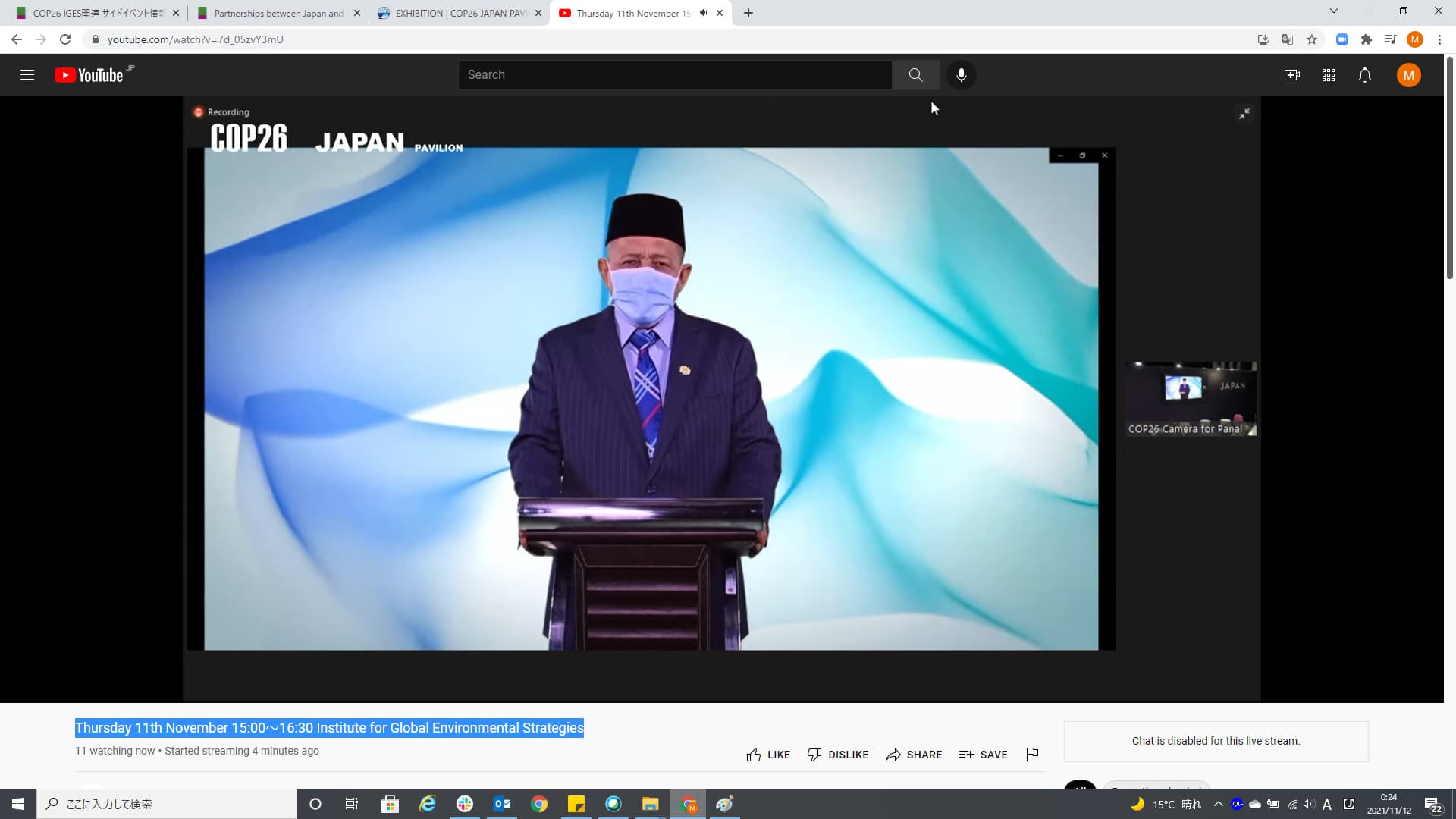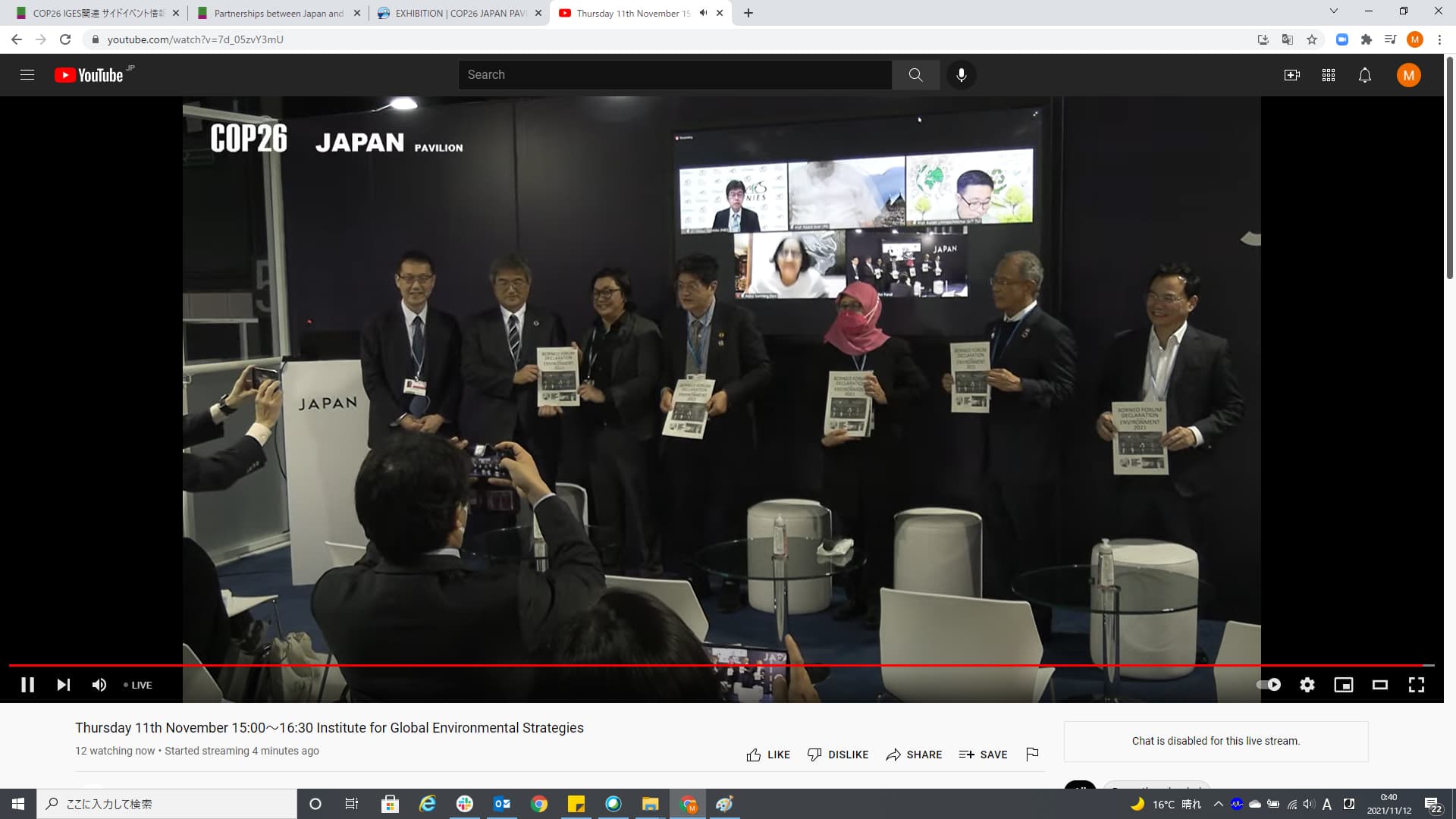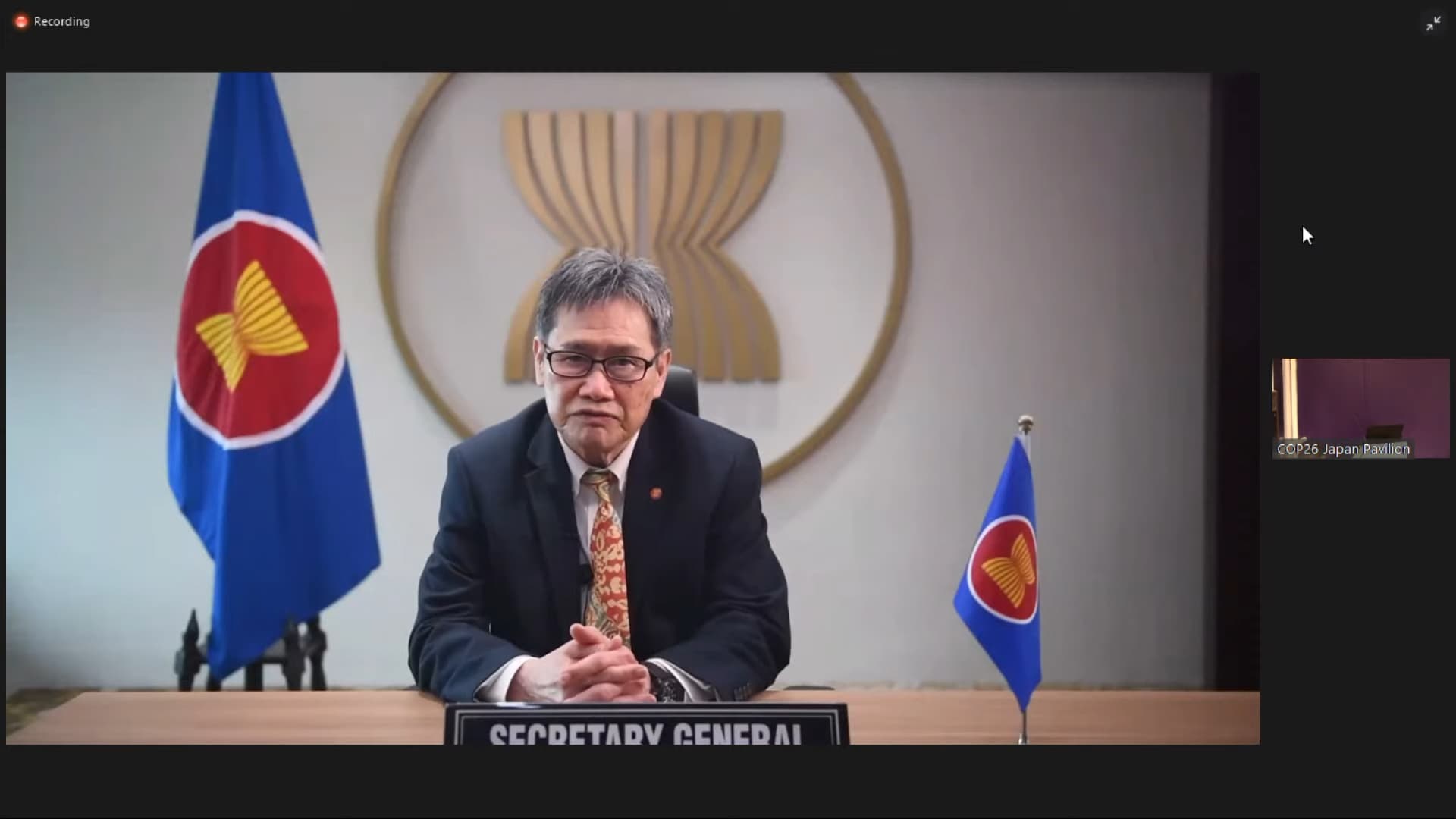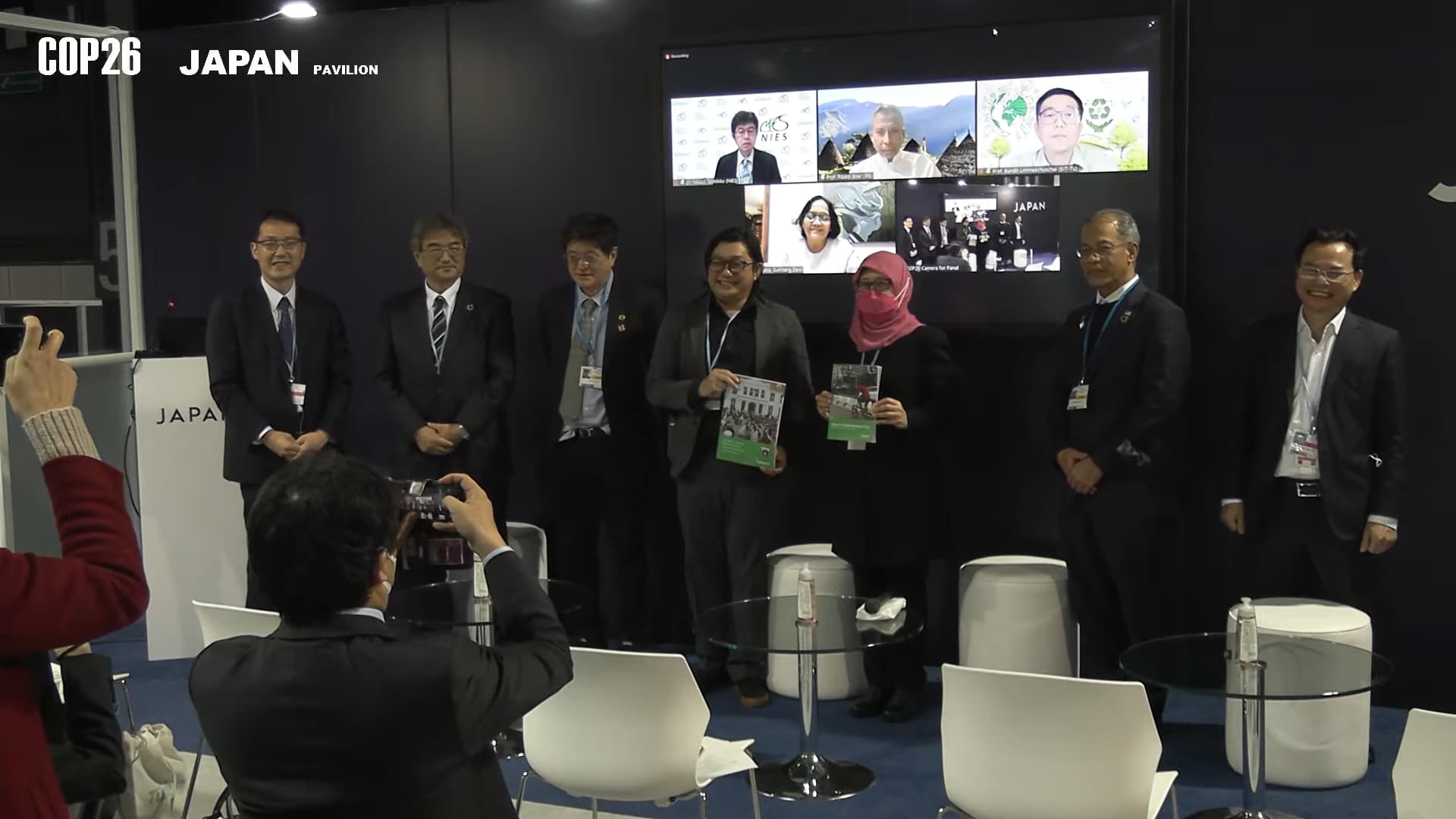2021.11.11 THU
15:00 - 16:30
2021.11.11
Zero Carbon Partnerships between Japan and Asia for a New Age – Using the Asia-Pacific Integrated Model (AIM) to pave the way for carbon neutrality –
Institute for Global Environmental Strategies (IGES)
Co-organizer
Ministry of the Environment, Japan (MOEJ), National Institute for Environmental Studies (NIES)
Seminar abstract
On the occasion of COP26, several countries in Asia have committed to achieve carbon neutrality by 2050 or by the latter half of the century. As basis for such commitments, some countries have utilised middle- to long-term greenhouse gas emission scenarios calculated by the Asia-Pacific Integrated Model (AIM). Meanwhile, on the road to COP26, the ASEAN Secretariat, in collaboration with IGES and other organisations, recently launched the ASEAN State of Climate Change Report (ASCCR), which provides insight into how to achieve carbon neutrality by 2050 or in the latter half of the century as a region.
The Ministry of the Environment, Japan (MOEJ) and the AIM project team provide technical support for developing long-term strategies in several countries in the Asian region. In addition, they support creating strategies for decarbonisation or carbon neutrality in some cities in this region and play an important role by helping these cities implement such strategies. AIM has fostered collaboration across Asia over more than two decades.
At this side event, we will highlight remarkable efforts by countries, regions and local governments, and discuss about the role of political leadership and supporting tools such as AIM to achieve carbon neutrality in a sustainable manner.
Speakers
- • Mr. SHODA Yutaka Ministry of the Environment, Japan Vice Minister for Global Environmental Affairs
• Mrs. Emma Rachmawaty Ministry of Environment and Forestry, Indonesia Director, Climate Change Mitigation – DG, Climate Change
• Mr. Pham Van Tan Ministry of Natural Resources and Environment, Vietnam Deputy Director General, Department of Meteorology, Hydrology and Climate Change
• Dr. FUJINO Junichi IGES Programme Director, Integrated Sustainability Centre
• Mr. Irvan Pulungan Jakarta City Climate Envoy
• YBhg. Datuk Seri TPr. Hj. Mahadi Bin Che Ngah Kuala Lumpur City Hall, Malaysia Mayor
• Prof. Chin Siong Ho UTM, Malaysia Professor
▼Online speakers
• H. E. Dato Lim Jock Hoi ASEAN Secretary General
• H. E. Dato’ Seri Dr. Shahidan Kassim Ministry of Federal Territories, Malaysia Minister
• Prof. Priyadarshi Shukla IPCC WGIII Co-chair
• Dr. MASUI Toshihiko NIES, Japan Head, Social Systems Division(Decarbonization Measures Assessment Section)
• Prof. Bundit Limmeechokchai SIIT-TU Professor
• Prof. Rizaldi Boer IPB, Indonesia Professor
• Prof. Retno Gumilang Dewi ITB, Indonesia Professor
• Dr. Ucok WR. Siagian ITB, Indonesia
Session Summary
The side event kicked off with the Secretary-General of ASEAN, who introduced the ASEAN State of Climate Change Report (ASCCR), launched in October 2021. The report is the first science-based report to provide a clear picture of the current status of ASEAN countries with respect to both climate change mitigation and adaptation, and a concrete roadmap for 2030 and 2050.
Then, the Asia-Pacific Integrated Model (AIM) project team spoke about their collaboration with Asian countries, which began in the 1980s. Then, the co-chair of the IPCC Working Group III highlighted the importance of establishing a foundation of science-based policymaking, to which the AIM project team has been contributing in Asia.
In recent years, the Ministry of the Environment, Japan (MOEJ) and the AIM project team have been providing technical support for developing long-term strategies in several countries in the Asian region. For example, Indonesia’s “Long-term Strategy for Low Carbon and Climate Resilience 2050” featured analyses based on AIM outputs. Similarly, Thailand mentions AIM’s contributions in its “Mid-century, Long-term Low Greenhouse Gas Emission Development Strategy”. At the side event, researchers from Indonesia and Thailand, who were directly involved in the model analyses of their respective countries, briefly explained their work. Regarding their brief overview, one policymaker from Indonesia expressed appreciation for Japan’s contributions to science-based long-term strategies, as well as to capacity development in Asia. One Vietnamese policymaker also expressed gratitude for the AIM project team’s technical support in calculating emission peak years in Viet Nam, with hope that these collaborative efforts would continue.
In addition to providing technical support at the national level, MOEJ and the AIM project team have supported the development of strategies for carbon neutrality in some Asian cities, such as Kuala Lumpur and Jakarta. After brief presentation made by an AIM expert in Malaysia, the Minister of Federal Territories, Malaysia, Mayor of Kuala Lumpur, and the Climate Envoy in Jakarta City mentioned AIM’s significant contributions to city-level activities and policy implementation in Asia.
Message and Results
On 11 November, IGES released a video on the ASEAN State of Climate Change Report (ASCCR). The ASCCR initiated and coordinated by the ASEAN Secretariat, together with the Institute for Global Environmental Strategies (IGES), under the purview of the ASEAN Working Group on Climate Change (AWGCC) and the ASEAN Senior Officials on Environment (ASOEN). It was made possible with immense support from the Government of Japan through Japan-ASEAN Integration Fund.
The video features congratulatory speeches and comments on the completion of the report by H.E. Kung Phoak, Former Deputy Secretary-General of ASEAN for ASEAN Socio-Cultural Community of the ASEAN Secretariat, Mr. Yutaka Shoda, Vice-Minister for Global Environmental Affairs at the Ministry of the Environment Japan, and Mr. Yasuo Takahashi, Executive Director of IGES. In their remarks, they each touch on the background and future prospects of this report, and emphasise the importance of the report as a major step towards decarbonisation and sustainable development in the ASEAN region. Following these remarks, IGES Policy Researcher Dr. Yosuke Arino, an author of the ASCCR, provides an overview of the report and its key points.
As emphasised in statements and by actions of ASEAN countries widely reported at COP26 in Glasgow, the ASEAN region will become increasingly important for global decarbonisation. Against this backdrop, this is the first science-based report to provide a clear picture of the current status of ASEAN countries with respect to both climate change mitigation and adaptation, and a concrete roadmap for 2030 and 2050.
We hope that this video provides people with a better understanding of the significance and overview of the report.
Video: https://youtu.be/w4uMlEc0FeU
Report: https://www.iges.or.jp/en/pub/asean-state-climate-change-report/en




2021.11.11 THUTimetable
10:30 - 12:00
2021.11.11
Ministry of the Environment (Global Environment Bureau, International Cooperation and Environmental Infrastructure Strategy Office)
13:00 - 14:30
2021.11.11
Research Institute of Innovative Technology for the Earth (RITE)
17:00 - 18:30
2021.11.11
Ministry of the Environment Japan, EU, UNEP, UNIDO, Government of the Netherlands and World Economic Forum
